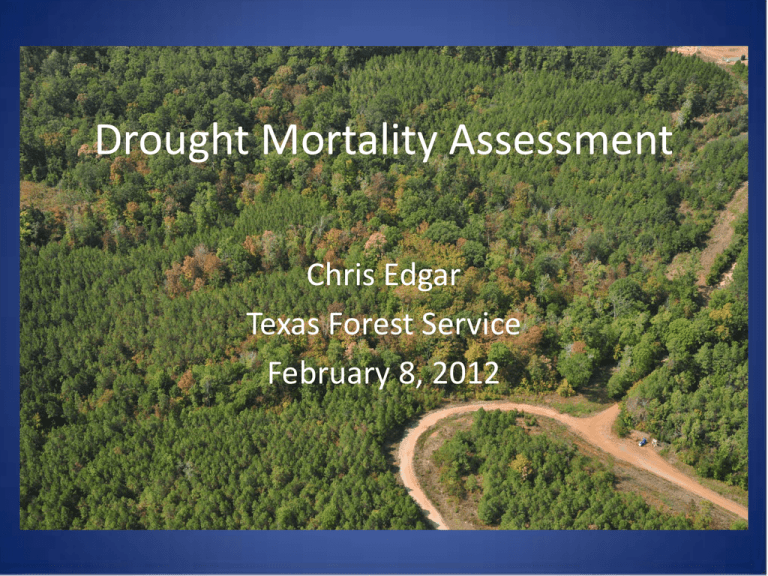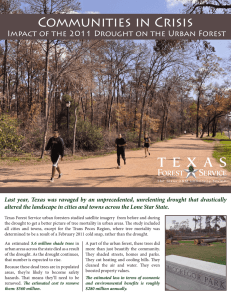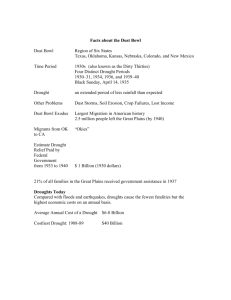Drought Mortality Assessment Chris Edgar Texas Forest Service February 8, 2012
advertisement

Drought Mortality Assessment Chris Edgar Texas Forest Service February 8, 2012 “The date of the onset of the 2011 drought can be stated with remarkable precision: September 27, 2010. On that date a storm system bringing widespread rain to Texas left the state. Though it could not be known at the time, twelve of the next thirteen months would bring below-normal precipitation to Texas.” John W. Nielsen-Gammon Texas State Climatologist The 2011 Texas Drought A Briefing Packet for the Texas Legislature October 31, 2011 Drought Monitor Drought Severity Classification http://droughtmonitor.unl.edu/classify.htm Drought Monitor A New map of latest conditions is released every Thursday http://droughtmonitor.unl.edu/monitor.html Drought Monitor for September 28, 2010 Conditions at the “onset” of the drought http://droughtmonitor.unl.edu/archive.html December 7, 2010 October 4, 2011 March 1, 2011 June 7, 2011 Central & West Texas East Texas 4,305 forest plots 2,260 forest plots Forest Inventory and Analysis 63 million acres of forestland in state 4.9 billion trees with at least 5” diameter on forestland The onset of the drought in late September 2010 Moderate drought conditions spread to encompass more area of forest Extreme drought conditions begin to occur in forest areas January precipitation slightly above normal Drought conditions spread to cover most area where forests occur Exceptional drought conditions extend over many areas where forests occur Normal conditions begin to appear in some forest areas Drought Impacts to Trees • Fewer needles or leaves • Early dormancy • Reduced growth and loss of vigor • Increased susceptibility to insects and disease • Death Tree Death • Carbon starvation – Negative carbon balance resulting in depletion of carbohydrates reserves • Hydraulic failure – Water stress increases leading to interruption of the water column and tissue dehydration Pine plantation that is mostly green Mixed natural forest with shades of brown and grey showing impacts of drought Aerial photograph by Ron Billings near Nacogdoches, TX, August 26, 2011 Preliminary Estimate of Mortality • We surveyed foresters and asked them the likely range of mortality in their area • This information was combined with Forest Inventory and Analysis data on the number of trees – Trees at least 5 inches in diameter – Trees on forestland – Does not include urban areas Preliminary Estimate of Mortality • 100 million to 500 million trees have died as a result of the drought • 2 to 10 percent of all trees on forestland in the state • Localized pockets of heavy mortality were reported for many areas • Several multi-county areas appear to be especially hard hit Sutton, Crockett, western Kimble and eastern Pecos Counties Juniper mortality just east of Sonora off of Interstate 5 Google Earth Pine mortality in Harris, Montgomery, Grimes, Madison and Leon Counties About 200,000 acres were reforested the last two years in East Texas An estimated 116,000 acres will need some level of reforestation Costs to restore these lands is estimated to be $57,000,000 Inventory to assess mortality on 1,700+ acre W. G. Jones State Forest near Conroe, TX 6.1 percent of trees have died as a result of the drought 2.2 percent more are not expected to survive Next Steps • Use remote sensing to identify areas where “greenness” has changed • Send foresters in the field to measure sample plots and trees to more thoroughly assess mortality • Produce an updated estimate of tree mortality this summer Bear Creek Fire in Cass and Marion Counties Bear Creek Fire in Cass and Marion Counties Forest Threat Assessment Center Forest NDVI Change (USFS TACs-NASA) Disturbance Since 2010 – 1Year Baseline http://ews.forestthreats.org/ Historical Droughts • According to the state climatologist 13 droughts have surpassed -4 (extreme drought) on the Palmer Drought Severity Index (PDSI) in 3 or more of the state’s 10 climatic divisions since 1895 5 of the 13 droughts resulted in PDSI below -4 in East Texas 1915-1918 1924-1925 1950-1957 2005-2006 2010-2012 • 2010-2012 has the lowest PDSI (-6.47) • 1915-1918 has the highest number of months (10) at or below PDSI -4 • 1950-1957 has highest number of months (40) at or below PDSI -2 Loblolly Pine 11 of the 13 droughts resulted in PDSI below -4 in the Edwards Plateau 1908-1911 1915-1918 1924-1925 1933-1935 1950-1957 1961-1966 1966-1967 1995-1996 1999-2002 2005-2006 2010-2012 • 1950-1957 had the lowest PDSI (-6.08), the highest number of months (29) at or below PDSI -4, and the highest number of months (66) at or below PDSI -2 Live Oak QUESTIONS? Chris Edgar (979) 458-6630 cedgar@tfs.tamu.edu


